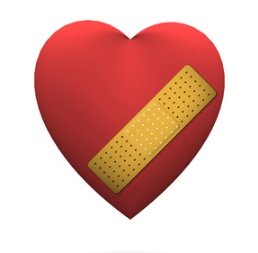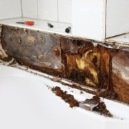Find a pre-screened local mold removal specialist Free Estimate
Find a Mold Specialist Now
Click or Call, Toll-Free 24/7
Heart Damage
From Mold Exposure
You probably know that exposure to mold in the home is not healthy but are you aware it can cause serious health problems, including heart damage and heart inflammation, also known as myocarditis? It’s true that damage to the heart and other organs is not a common effect of mold exposure, but it can happen and when it does, the results can be devastating.
How Does Mold Cause Heart Damage?
In healthy individuals, exposure to mold typically causes only minor symptoms and those are often respiratory in nature – a runny nose, a cough, sneezing, maybe a sinus infection or bronchitis. There are always exceptions and even previously healthy folks can become seriously ill due to mold exposure, but those with pre-existing health problems are at greatest risk.
Organ damage, including damage to the heart, occurs when the immune system is unable to fight off a mold-related infection. Infection can travel through the bloodstream and affect one or more of the body’s vital organs, including the heart. Sometimes a widespread infection occurs, affecting many body systems at once, a condition known as sepsis. A high fever is usually present, along with other symptoms.
Mold can cause a number of heart problems, including myocarditis (inflammation of the heart muscle), endocarditis (an infection of the lining of the heart), damage to the heart muscle and damage to the heart valves. While most types of mold can lead to heart problems, a few types are known for being particularly dangerous in this regard, including aspergillus, paecilomyces and phialophora.
Symptoms of heart inflammation and other heart problems may include a fever, fatigue, dizziness, headache, shortness of breath, chest pain, neck and shoulder pain, fainting, achy muscles, and swollen, painful joints. If you are experiencing heart problems due to mold, you may also be experiencing respiratory symptoms, like coughing, sneezing, a runny nose, a sore throat, and itchy, watery eyes. Of course, heart trouble is more serious than a cough or a runny nose, and if you experience symptoms of heart problems, you should see your doctor right away. Prompt treatment may prevent permanent heart damage.
If you experience symptoms of a possible heart attack, including chest pain, neck or shoulder pain, a heartburn-like sensation, dizziness, sweating and shortness of breath, you should go directly to the nearest emergency room or call 911 (in the United States). Heart attacks are life-threatening and you need immediate medical attention.
 Mold on ceiling
Mold on ceilingPrevention and Treatment of Mold-Related Heart Damage
You may be able to prevent serious mold-related infections and subsequent organ damage by avoiding exposure to mold when possible and by seeking treatment for any mold-related health problems right away. If you have compromised immune system functioning for any reason or take medication that lowers immunity, it is especially important to avoid mold. If you discover mold in your home, you should arrange to have the mold removed as soon as possible.
The U.S. Environmental Protection Agency recommends consulting your physician before attempting to clean up mold yourself if you have health problems that might be made worse by exposure to mold. If your health is severely compromised, your doctor may even recommend not staying in your home until the mold can be removed. Talk to your doctor about how to protect yourself.
Of course, if you’ve developed an infection serious enough to damage your heart, you’ll require medical care. You may need to see an infectious disease specialist to treat the fungal infection, but you’ll also need a good cardiologist to treat your heart problems. Hospitalization will probably be required. You may need intravenous medication and may even require surgery.
In order to make a full recovery, though, you’ll need to have the mold removed from your home. Otherwise, you will probably succumb to additional mold-related infections as soon as you return home.
Getting Help with Mold Removal
If possible, you should arrange to have the mold removed from your home while you are receiving medical care so that you can return to a safe and mold-free home. We recommend scheduling a free consultation with a mold removal professional who can explain the work that needs to be done in your home and answer all your questions. He or she can also explain your payment options and may even be able to help you get your home owner’s insurance policy to cover some of the cost. You can find experienced mold removal professionals offering free consultations in your area by following the link provided.
Return From Heart Damage To Our Main Symptoms Page
Free Home Inspection By A Mold Removal Specialist
Search This Website

Recent Articles
-
See Our 5 Recommended Mold Removal Companies in Covington, KY
Apr 16, 25 12:59 PM
-
See Our 5 Recommended Mold Removal Companies in Wheaton, IL
Jun 20, 24 10:33 AM
-
See Our 5 Recommended Mold Removal Companies in Aberdeen, SD
Oct 08, 21 04:05 PM




